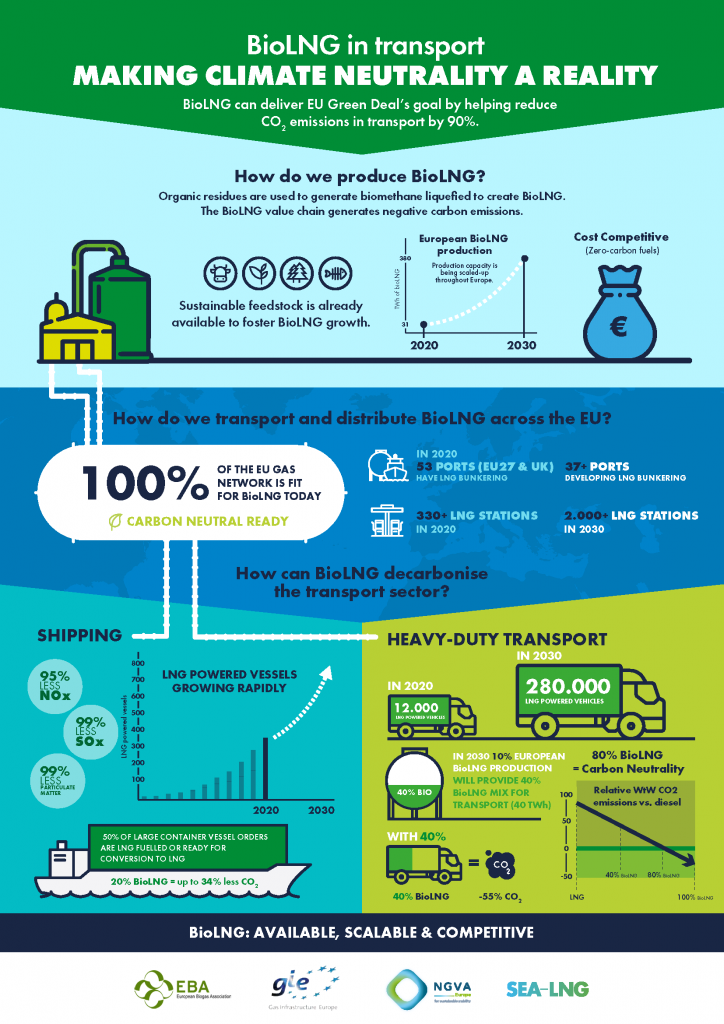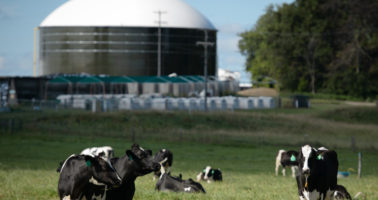Brussels, 23 November 2020
The European Biogas Association (EBA), Gas Infrastructure Europe (GIE), the Natural Gas and Vehicle Biogas Association (NGVA Europe) and SEA-LNG published a joint document, which demonstrates the concrete benefits of using BioLNG to decarbonize hard-to-beat transportation sectors through the provision of the latest facts and figures.

Ahead of the next Smart and Sustainable Mobility Strategy to be published by the European Commission in December, the document calls on European institutions to recognize BioLNG's potential to meet greenhouse gas (GHG) targets, and to continue recognizing the benefits available today of LNG and BioLNG in maritime and road transport to reduce GHG emissions as well as local pollution harmful to the health of EU citizens.
The joint document highlights the true potential of BioLNG to decarbonize heavy haulage and shipping quickly and cost-effectively. It illustrates how BioLNG can help the EU achieve its climate targets by 2030 and become climate neutral by 2050. Since the BioLNG production process sequesters carbon, the BioLNG value chain generates negative carbon emissions. Therefore, by running EU trucks with 100% BioLNG, it is possible to remove CO2 emissions from the atmosphere.
EU BioLNG production is projected to grow tenfold by 2030. EU heavy LNG transport is expected to reach 280,000 units in the same period. Using a mix of BioLNG from the 40% with LNG will help reduce the CO2 emissions from those trucks in a 55%. This can be achieved using only 10% (40TWh) of Europe's total BioLNG production (380TWh). In the shipping industry, 50% of today's large container ship orders are LNG or ready for conversion to LNG. 20% from the BioLNG blend in shipping would reduce CO2 emissions by up to 34%. In mid-November, the SEA-LNG member Total completed the world's largest LNG bunkering operation to date in Rotterdam, supplying 17,300 cubic meters of LNG to a French 23,000 TEU ultra-large container ship, of which the 13% was BioLNG.
BioLNG can be transported using the existing LNG infrastructure without further technological adaptations or additional costs. For this reason, the support of the LNG infrastructure is essential to ensure the deployment of Bio-LNG in the coming years. Today, the European Union has 53 ports where LNG supplies are available and more than 330 LNG filling stations. This number will increase exponentially in the coming years. In the case of LNG stations, it will be six times higher, reaching 2,000 LNG stations in 2030. The use of the current infrastructure also drives BioLNG's cross-border trade in Europe.
"BioLNG is available today and scalable for tomorrow. It is a sustainable and cost-competitive fuel and carbon neutrality when we take into account all the positive externalities of the Bio-LNG value chain. To ensure maximum potential of production and maximum benefit for EU consumers, the new revision of the EU Renewable Energy Directive should integrate more raw materials, such as waste that cannot be used for other purposes and secondary crops. The EU must also create a single market for biomethane and BioLNG by facilitating the trade of volumes and certificates across EU borders without technological or political barriers."
Harmen Dekker, Director of the European Biogas Association
"The infrastructure we use today for LNG can be used tomorrow for BioLNG with little or no modifications. There are no stranded assets - just scale effects for climate-neutral BioLNG. If we want to succeed in cleaning up transportation, it will be "It is crucial that the EU recognizes the vital role of LNG infrastructure in the Smart and Sustainable Mobility Strategy."
Roxana Caliminte, Deputy Secretary General of Gas Infrastructure Europe added
"By integrating the fuel dimension and recognizing the benefits of gas in transport in files such as the Smart Mobility Strategy and the review of the CO₂ Emissions Performance Standards Regulation, the EU will enable and stimulate the decarbonisation effect of BioLNG. This is thanks to its already existing and rapidly growing fleet of vehicles and the available fueling infrastructure."
Andrea Gerini, Secretary General of NGVA Europe
"BioLNG provides a proven and commercially viable way to progressively decarbonise the European shipping industry using existing LNG vessels and infrastructure. We continue to advocate that regulators adopt a targets-based approach founded on technological openness, and ensure true "A level playing field between different mobility solutions. Whether on a well-to-wheel or well-to-sail basis."
Steve Esau, Managing Director of SEA-LNG

